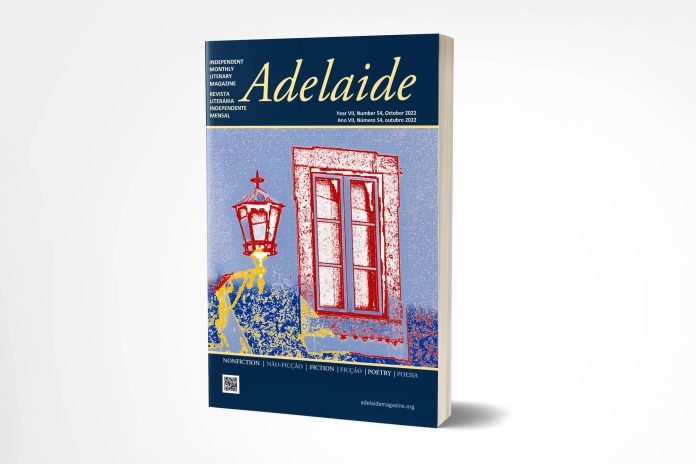The Runner
On feet of dreams the runner’s headed to land’s end.
She knows the horizon keeps receding while she’s running,
but she runs as though it didn’t.
A finish line is not her aim.
Along the pathway time’s not measured in seconds but in paces,
in fact a runner’s time and space commingle.
The run will come to a stop where dreams dissolve,
and dreams don’t hinge on time or space
but on the run itself.
Land’s end is but a moving sight, the pathway a circle.
Fugitive
The third round of the air raid sirens
didn’t give you the time
to collect your thoughts or anything.
A few nonessential personal belongings,
a pair of books and an old diary
remained on the table.
A black and white picture
neatly framed in silvered wood, too.
It shows a frightened child
looking into the camera askance,
a rag doll clutched to her chest,
hand in hand with mom,
who stares into the distance blankly,
as if the lensman weren’t in front of them.
Noway, you shouldn’t have fled a second time,
bringing with you all you could put on and a bag,
the fear and wrinkles of today
alongside the horror and scars of the past.
And you shouldn’t have left the picture behind.
It must still be there,
in the dark and silence of deserted places,
on the table crying out for vengeance.
Waiting for someone to return
and throw open the windows again.
The Kite
The kite was flown
when you still had not arrived,
far with mind and body
from that unguarded edge
whereon you’d count the seconds.
It soared so plumb
that for you it was no signal
to go back on your steps,
but one final warning
not to turn around.
Then sun was enlarging
above the horizon you’d been denied.
Before it got dark,
legs and arms ready for takeoff,
eyes nailed to the floor,
you launched time into space
and rose higher than upmost dreams,
beyond the first star
shyly peeping at the zenith.
No one saw you but briefly the kite.
Story Of A Loser
The crumpled trench coat was hanging on the clothes tree;
the rain-streaked panes were letting in some light, no view.
It had been a frantic day, now he was staring at the embers,
sunk in the armchair, trying to make his bad blood cool off.
Miry lug sole footprints smudged the terracotta pavement,
marked a track from the threshold straight to the fireside.
There was nothing he wanted to think about or wished,
nothing but crackle counterpointing the chilly silence,
among which the patter on the glass barely emerged.
Like with the exhausted legs, weighed down and sore,
he’d abandoned all ambitions, dropped the will to fight.
All he’d been or he’d done was scattered behind by then,
today on top of tomorrow, strewn with snips of yesterday.
All pell-mell, without the slightest intention of tidying it up,
except for the lived-in slicker precipitously hung out to dry.
Despite the proximity of the hearth, his hands were numb;
only sere, darkened images were popping into his head.
He couldn’t possibly imagine he would soon go blind,
blind because of too much exposure to the afterglow,
nor the longest journey he’d ever go on had just begun.
I can recall each detail, yet I find it hard to utter his name.
Affront To Deities
Primitive and impulsive, the urge to yield to something inborn,
which came naturally to him—like back when merciless Anteros
led the dance, or so it seemed—eventually took him by storm.
Free from constraints, restraints, dictates and others’ desiderata.
Did he notice how beautiful the sky was—either clear and blue
or bleak and gray—beautiful for the mere fact that it was there,
since ever and forever, immovable though eternally changing—
whether somebody observes it in awe or nobody cares at all.
In the back of his mind, he fancied the same goes for the spirit—
however peaceful or restless—beautiful anywise, more sublime
than any other impermanent flash of consciousness, thorough,
in its inaccessible quintessence, in the purity of its transience.
He then went looking for a footpath—a legacy of days gone by—
in the early-summer heat, through what remained of the wood
along the river, once a beaten track, well-kept, now only used
by few romantic anglers, nearly erased by shrubs and oblivion.
Deep in the trees, each thought dissolved for a good half hour,
his cognition itself disappeared among the leaves, just instinct,
breathing and the automatism of footsteps survived the walk.
Come the end of it, of a sudden, in front of the dropping sun,
he emerged onto a wide shore such as he didn’t expect to find—
reshaped by the years, or by the fallacy of his memories—alone,
to gaze impassively at the slow flow of the water—a sad trickle
he could barely call a river, as adrift amidst the vast sandbanks.
Not tired, not even a little, brisk and sensitive as never before,
absolutely sure of having done what absolutely had to be done,
one with the odd surroundings, regretless, fulfilled and happy.
Sure—happy to the core for having satisfied his primal desire,
for not having repressed it again, intimate with the true beauty,
the unadorned trueness of here and now, as if time had stopped
to hand him everything he had always been longing for, at last.
Complete—in spite of Aphrodite, Artemis, Ares and all of them.
Alessio Zanelli is an Italian poet who writes in English. His work has appeared in some 200 literary journals from 17 countries. His fifth collection, “The Secret Of Archery”, was published in 2019 by Greenwich Exchange (London). For more information please visit www.alessiozanelli.it.



















